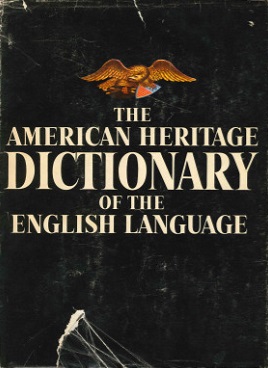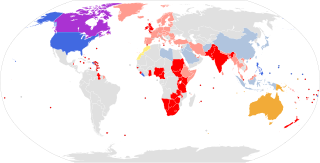Supplementary volume
In 1727, Bailey published a supplementary volume entitled The Universal Etymological English Dictionary, Volume II. Volume II, almost 900 pages, has some duplication or overlap with the primary volume, but mostly consists of extra words of lesser circulation. It was not as popular as the primary volume. The title page of the supplementary volume says it contains "An additional collection of words (not in the first volume) ALSO an explication of hard and technical words in all arts and sciences... ALSO words and phrases contained in our ancient charters, statutes, and processes at Law ALSO the theology and mythology of the Egyptians, Greeks and Romans...."

An encyclopedia or encyclopaedia is a reference work or compendium providing summaries of knowledge, either general or special, in a particular field or discipline. Encyclopedias are divided into articles or entries that are arranged alphabetically by article name or by thematic categories, or else are hyperlinked and searchable. Encyclopedia entries are longer and more detailed than those in most dictionaries. Generally speaking, encyclopedia articles focus on factual information concerning the subject named in the article's title; this is unlike dictionary entries, which focus on linguistic information about words, such as their etymology, meaning, pronunciation, use, and grammatical forms.

The Oxford English Dictionary (OED) is the principal historical dictionary of the English language, published by Oxford University Press (OUP), a University of Oxford publishing house. The dictionary, which published its first edition in 1884, traces the historical development of the English language, providing a comprehensive resource to scholars and academic researchers, and provides ongoing descriptions of English language usage in its variations around the world.
A thesaurus, sometimes called a synonym dictionary or dictionary of synonyms, is a reference work which arranges words by their meanings, sometimes as a hierarchy of broader and narrower terms, sometimes simply as lists of synonyms and antonyms. They are often used by writers to help find the best word to express an idea:
...to find the word, or words, by which [an] idea may be most fitly and aptly expressed

A Dictionary of the English Language, sometimes published as Johnson's Dictionary, was published on 15 April 1755 and written by Samuel Johnson. It is among the most influential dictionaries in the history of the English language.
Linguistics is the scientific study of language, involving analysis of language form, language meaning, and language in context.
Nathan Bailey, was an English philologist and lexicographer. He was the author of several dictionaries, including his Universal Etymological Dictionary, which appeared in some 30 editions between 1721 and 1802. Bailey's Dictionarium Britannicum was the primary resource mined by Samuel Johnson for his Dictionary of the English Language (1755).
Webster's Dictionary is any of the English language dictionaries edited in the early 19th century by Noah Webster (1758–1843), an American lexicographer, as well as numerous related or unrelated dictionaries that have adopted the Webster's name in his honor. "Webster's" has since become a genericized trademark in the United States for English dictionaries, and is widely used in dictionary titles.

The American Heritage Dictionary of the English Language (AHD) is a dictionary of American English published by HarperCollins. It is currently in its fifth edition.

The Century Dictionary and Cyclopedia is one of the largest encyclopedic dictionaries of the English language. It was compared favorably with the Oxford English Dictionary, and frequently consulted for more factual information than would normally be the case for a dictionary.
Honorificabilitudinitatibus is the dative and ablative plural of the medieval Latin word honōrificābilitūdinitās, which can be translated as "the state of being able to achieve honours". It is mentioned by the character Costard in Act V, Scene I of William Shakespeare's Love's Labour's Lost.

Despite the various English dialects spoken from country to country and within different regions of the same country, there are only slight regional variations in English orthography, the two most notable variations being British and American spelling. Many of the differences between American and British/English in the Commonwealth of Nations date back to a time before spelling standards were developed. For instance, some spellings seen as "American" today were once commonly used in Britain, and some spellings seen as "British" were once commonly used in the United States.
The Nihon kokugo daijiten (日本国語大辞典), often abbreviated as the Nikkoku (日国) and sometimes known in English as Shogakukan's Japanese Dictionary, is the largest Japanese language dictionary published. In the period from 1972 to 1976, Shogakukan published the 20-volume first edition. The 14-volume second edition was published in the period from November 2000 to December 2001. It includes substantial additions to and improvements over the first edition.
Japanese dictionaries have a history that began over 1300 years ago when Japanese Buddhist priests, who wanted to understand Chinese sutras, adapted Chinese character dictionaries. Present-day Japanese lexicographers are exploring computerized editing and electronic dictionaries. According to Nakao Keisuke (中尾啓介):
It has often been said that dictionary publishing in Japan is active and prosperous, that Japanese people are well provided for with reference tools, and that lexicography here, in practice as well as in research, has produced a number of valuable reference books together with voluminous academic studies. (1998:35)
The New World of English Words, or, a General Dictionary is an English dictionary compiled by Edward Phillips and first published in London in 1658. It was the first folio English dictionary.
John Kersey the younger was an English philologist and lexicographer of the late seventeenth and early eighteenth centuries. He is notable for editing three dictionaries in his lifetime: A New English Dictionary (1702), a revised version of Edward Phillips' The New World of English Words (1706) and the Dictionarium Anglo-Britannicum (1708).

Benjamin Martin was a lexicographer who compiled one of the early English dictionaries, the Lingua Britannica Reformata (1749). He also was a lecturer on science and maker of scientific instruments.

A mortal wound is an injury that will ultimately lead to a person's death. Mortal refers to the mortality of a human: whether they are going to live or die. Wound is another term for injury. The expression can also be used figuratively.
This page is based on this
Wikipedia article Text is available under the
CC BY-SA 4.0 license; additional terms may apply.
Images, videos and audio are available under their respective licenses.







